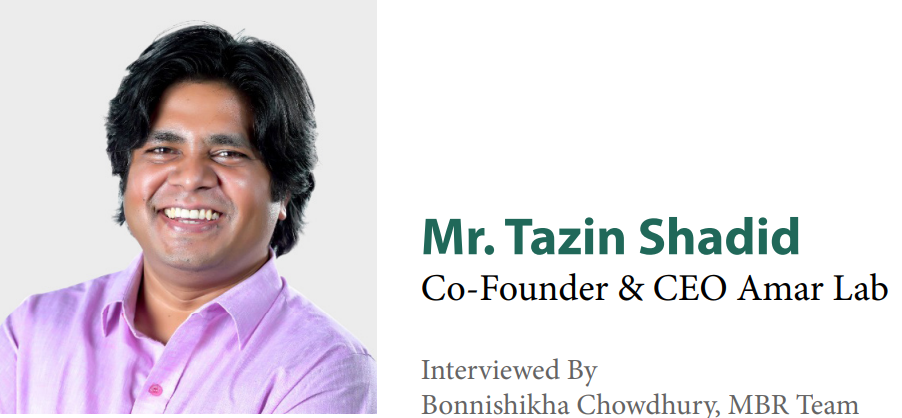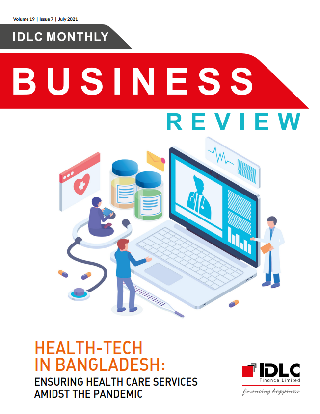
Mr. Tazin Shadid: Co-Founder & CEO Amar Lab
Interviewed By Bonnishikha Chowdhury, MBR Team
MBR: What is the unique service of AmarLab? How is its product differentiated in the market?
Mr. Tazin Shadid: AmarLab aims to provide a complete urgent healthcare solution to patients which could be availed from home. We are now working in four areas: online doctor consultation, diagnostic tests, prescribed medicine delivery, and lastly, health data. Our main goal is to make these healthcare services accessible to everyone. We choose to solve issues related to diagnostic tests first because of several reasons: many times, patients do not complete their required diagnostic tests after being prescribed by their doctors because of the hassle involved with doing a test. It is time-consuming, difficult, and for many patients, a challenge due to their age and physical condition. In the case of elderly patients, someone needs to accompany them while going for a test. Overall, the experience of doing diagnostic tests is not pleasant in most instances. We have built a platform where our users can go, select a test and diagnostic center of their choosing, and we then collect the sample and get the test done from the client’s preferred diagnostic center and
deliver the test report to the customer. In Bangladesh, no other platform gives you the freedom to choose a lab for diagnostic tests from multiple options and compare test prices. Within a few months after our initial launch, we pivoted and turned AmarLab into an online platform. We focused on working with the reputed diagnostic centers in the country. We don’t work with just any diagnostic centers. We are extremely quality conscious. We are regularly onboarding more labs and scaling up our platform.
MBR: Compared to other developed nations, how successful is Bangladesh in terms of tech health?
Mr. Tazin Shadid: One of the main things COVID has brought to our attention is, healthcare is a basic service and we need to focus on it. The vulnerability of our healthcare sector has been exposed because of the pandemic. I have lived in the US for about 17 years and from my experience, I can say that even in the US the healthcare sector still needs development. The overall healthcare sector has a huge opportunity for innovation and there are a lot of things that can be done. When we talk about innovation, we usually think about advanced technologies like Artificial Intelligence. But innovation can be done on the basic levels as well. For example, in Bangladesh, the system which has been developed for the registration of the COVID-19 vaccine is more effective than the system they are using in the US. In Bangladesh, all you have to do is to register online for the vaccine, go to the vaccination center, and you are done. It can be called a digital healthcare service and through this, a lot of people have been vaccinated. We can use this system in other healthcare vertices as well. In Bangladesh, there are a lot of opportunities in the healthcare sector. We need more competitors in the digital healthcare vertical. Competition accelerates innovation and quality.

MBR: What major challenges did you face while bringing AmarLab into existence? Looking back, what do you think were the major achievements of AmarLab?
Mr. Tazin Shadid: In terms of operation, we are completely different from other home-delivery services as we have to go inside the patients’ homes.
Timing is an important factor in our service. While collecting samples, our staff may have to wait for 10-15 minutes for the patients to get ready. Sometimes they face some challenges such as getting interrupted by a family member of the patient while collecting samples, etc. Even after collecting the samples, preserving them at the right temperature, and dropping them at the diagnostic labs within a time limit where the quality of the sample is intact. Since our staff has to face different types of challenges while collecting samples, we focused on those issues during our R&D. What type of instruments need to be used, what temperature to maintain, how to transport the samples maintaining optimum quality within the allocated time frame, etc. Challenges have been solved through R&D. And even now, we are always working towards improving the whole process and make it smoother. Also, there are different challenges for different types of patients. We have categorized our patients into four major groups: the first one is the elderly patients with chronic diseases
who need to do various diagnostic tests regularly. The second group is the pregnant women. They have to do regular diagnostic tests for about a year. The third group is the busy professionals for whom convenience and time are important. We collect samples even from their offices. The fourth group is the newborn babies. We had to figure out how to provide our service to different groups of patients. We have also focused on ensuring a safe working environment for our people. During the pandemic, our medical technologists had to visit COVID patients for testing — a high-risk job. They couldn’t maintain social distance like everyone else. We have an epidemiologist in our team, who has helped us to manage and run our operations amidst the pandemic. We have even trained our partners to deal with the current situation. One thing we have always focused on is providing a top-notch customer experience. From our experience, we have seen that in many cases the quality in healthcare is mostly about the compassion and empathy of the healthcare providers, which can affect the overall experience of healthcare. From day one, we have focused on our customer experience. We have seen that once someone takes our service; they do not go back to the diagnostic centers. Our customer acquisition so far is completely based on word of mouth. Prioritizing user experience has paid off for us. We have around 5000 recurring customers and they are spreading positive words for us based on their pleasant experiences while taking our service. That trust, satisfaction of the service receivers; is the most valuable thing we could have achieved. We are a
passionate value-driven organization. Making money was never our driving motivation. My co-founder, Dr. Zahid, and I have always wanted to solve healthcare problems in Bangladesh. We want to bring a change to the entire healthcare sector of Bangladesh through our work. We always welcome people who want to work and improve the healthcare sector of Bangladesh.
MBR: In the near future, do you plan on expanding your services in the rural areas, where such services are nearly absent?
Mr. Tazin Shadid: We have plans to expand across the country gradually. We have the tech team to execute this expansion. Remote testing is not a new thing. We have tests that we can’t do in Bangladesh. Hospitals or diagnostic centers usually collect samples for these tests and send them abroad. For example, we have partnered up with Dr. Lal PathLabs who do high-end tests and they are mainly India-based. All renowned hospitals and diagnostic centers of Bangladesh work with them. Dr. Lal PathLabs is one of our premium partners. We also offer several health checkup packages in collaboration with them. The point I wanted to make here is that, if we can do tests from abroad and then get the report delivered to Bangladesh, why can’t we implement the same model for the rural areas of Bangladesh? In terms of telemedicine, Spreeha, who is our partner, has launched telemedicine services in some remote parts of
Bangladesh such as Bandarban, Satkhira, etc. We have a collaboration with Spreeha. The patients from these areas can directly get a consultation from the doctors via video conferencing. We are planning to extend our service in those areas so that we can collect samples, bring them to Dhaka for tests and then deliver the digital report of the tests to the patients in those areas.
MBR: AmarLab has been in the recent cohort of Accelerating Asia, how has this opportunity helped the platform?
Mr. Tazin Shadid: The Accelerating Asia experience has been really awesome for us. Since the beginning of our journey, we might have gone through and excelled in challenges related to operations, customer satisfaction, etc. But through the Accelerating Asia experience, we learned a lot about building the business as well. Getting the opportunity to know other players in the field not only locally but internationally; this networking might not have been possible without this cohort. We have also received valuable mentorship from masters in the sector about building business, customer acquisition, and fundraising. We have been introduced to quite a large number of VCs and AmarLab is now raising funds. We have commitments for a $200,000 pre-seed fund. And we are looking forward to raising another $100,000. We have Accelerating Asia demo day soon.
MBR: What initiatives can be taken to assist customers who are not technologically sound especially for the elderly people who are one of your targeted patient groups?
Mr. Tazin Shadid: We have developed a well-established call center with highly trained employees who can answer almost everything you need to know
about a test you want to do. We realized in healthcare, personal communication plays a vital role in building trust. Not only the elderly people or people who are not technologically sound; generally we feel more comfortable when someone talks to us in person with empathy and tries to solve our problems. It is even more needed when it comes to healthcare.
MBR: With so many rising tech-health organizations, how does AmarLab intend to stand up in the crowd in the near future?
Mr. Tazin Shadid: As I mentioned earlier, we are a passionate, value-driven organization. Our customers are and will always be in the center while designing a solution. We practice empathy; which is a must we believe while serving healthcare. We have built a learning culture, where we approach everything with a learning mindset. We have tried to create a culture where we are
continuously striving to be better than yesterday. We concentrate on learning to grow as an organization, team, and individual. We are always working hard to improve our services. We have two doctors in our team one of them is an expert in healthcare management and the other is an epidemiologist. We have a member who looks after growth, a separate marketing expert, and also a separate department looking after the customer satisfaction part. This expertise we have as a team, I believe is unique and could drive us forward.
MBR: As you provide services by going inside people’s homes, how have you successfully incorporated this during Covid?
Mr. Tazin Shadid: I think Dr. Zahid or our medical officer can answer it better. But in my opinion, this is where we differ from others. When other diagnostic centers do sample collection at patients’ houses, they usually do not carry the right equipment to ensure safety measures. But we have a unique sample collection kit for that purpose which we plan to patent. It can be called our IP as we have developed it ourselves through R&D. We have a built-in waste management system in our sample kit to ensure the safe disposal of medical waste. Treating medical waste has a standard process. We have adopted those practices to ensure we are not throwing medical waste mindlessly. We have some quality procedures which we regularly maintain. Moreover, to make sure that the test reports are accurate we sometimes do tests in different labs at our own cost.
MBR: Could you kindly guide us through the entire process of how patients book appointments and the means for you to generate revenue?
Mr. Tazin Shadid: As I mentioned earlier, we have a call center working 7 days a week. Also, we have a website where people can book their tests. In Bangladesh, Facebook is a popular media nowadays; keeping that in mind, one can even simply inbox us on our Facebook page to book tests. Once a patient contacts us by any of these means, we take all necessary information and ask the patient from where we’d do the tests. Then we send our medical technologists to patients’ homes as per the schedule to take samples. The samples are dropped at the patients’ preferred labs; and when the reports are ready, we deliver the reports to their homes and send them soft copies as well. We work based on a revenue-sharing model with our premium partners. Apart from that, we charge our customers a flat fee of $3 which equals BDT 200 for our service and sometimes we waive this fee. But that’s our other revenue stream. While most of our lab partners are premium partners, we have some regular partners as well. We don’t earn from these partners but if our customers choose these labs, we can get the tests done from these labs. The model is a bit complex which depends on the types of labs and the tests. For example, for the CBC test, the government has a fixed rate and we have to go with that. Then some tests are expensive and the revenue generated from those tests is split between us and our partners. The number of customers and tests also matters here. So, it varies from lab to lab.

HEALTH-TECH IN BANGLADESH: ENSURING HEALTH CARE SERVICES AMIDST THE PANDEMIC
Health-tech in Bangladesh: Safeguarding the country’s health care sector with constant improvement
With the vision of Digital Bangladesh, the nation has set its foot on the path of digitization. Last year when the entire country saw an influx of Covid-19 cases, e-health allowed healthcare to reach the households of Bangladesh allowing patients to receive quality health services in the palm of their hands by ensuring
safety measures. Initiatives were taken in the past to establish e-health services in Bangladesh, however, due to lack of technological advancement imperceptible advancement were made. At present with a significant amount of the population having access to mobile phones and the internet has made the availability of e-health services feasible.
Exploiting the blessing of artificial intelligence several new health-tech platforms have emerged in Bangladesh. These platforms are not only standing by the side of the Covid-19 affected patients but also with patients who are afraid of visiting doctors for other health-related issues during the pandemic. Starting from helping patients with mental health issues, to connecting patients with their desired doctors who can provide them with online consultations, to providing medicines at the patients’ doorsteps and providing pharmacies in remote areas with the required medical supplies, to providing diagnostic test services at home, all of these have been successfully implemented in Bangladesh, by the youth over the past few years.
The government has not been sitting behind in exploiting technology for health care, countless approaches were initiated by the government in order to reach out to the patients. Online portals have been established to keep the people updated with the latest Covid news, chatbots are delivering health services by extracting information from health experts of renowned organizations. Awareness is being spread to each citizen by the means of social media. Similar approaches like Bangladesh have also been taken by our neighbors India, Pakistan, and Nepal. While the city dwellers are benefitting from all the advancements, the rural poor are still being a victim of the digital divide. Even though several approaches have been initiated in the rural areas, they still have a long way to go.
As Bangladesh is still on its way towards digital Bangladesh, countless bridges need to be constructed in order to fill in the gap in the fractured healthcare
system. According to experts, the emerging e-health platform provides a path for the socio-economic development of the country. Hence, with proper utilization of resources, the country will be able to level up the health care sector, especially in the rural areas.
Bonnishikha Chowdhury
Executive Officer
IDLC Finance Limited